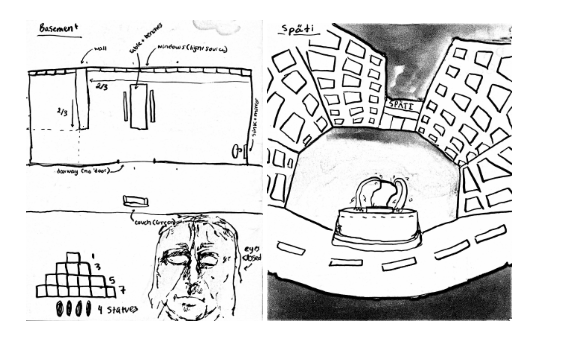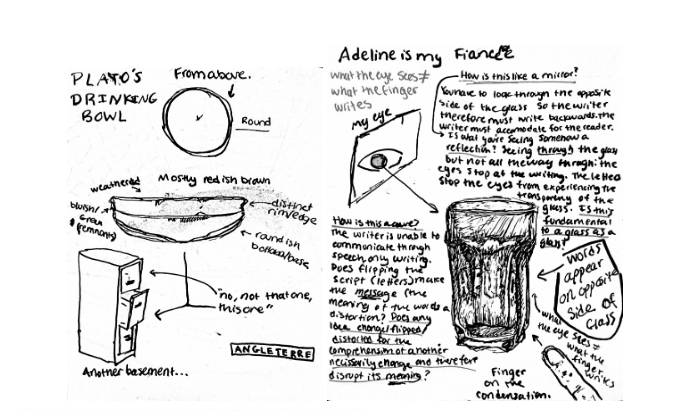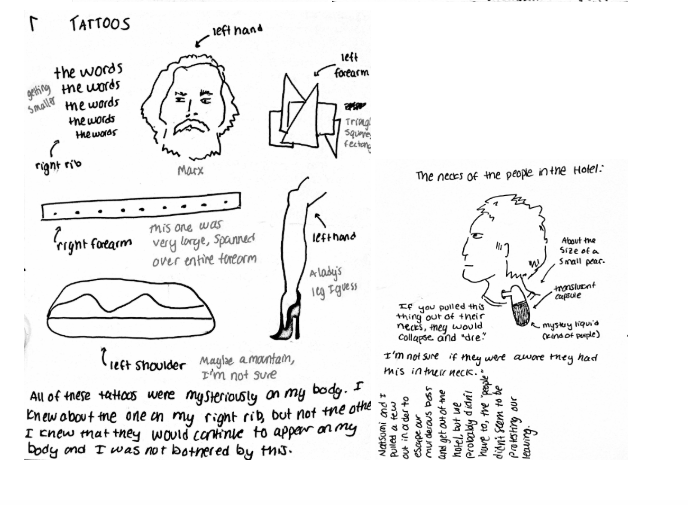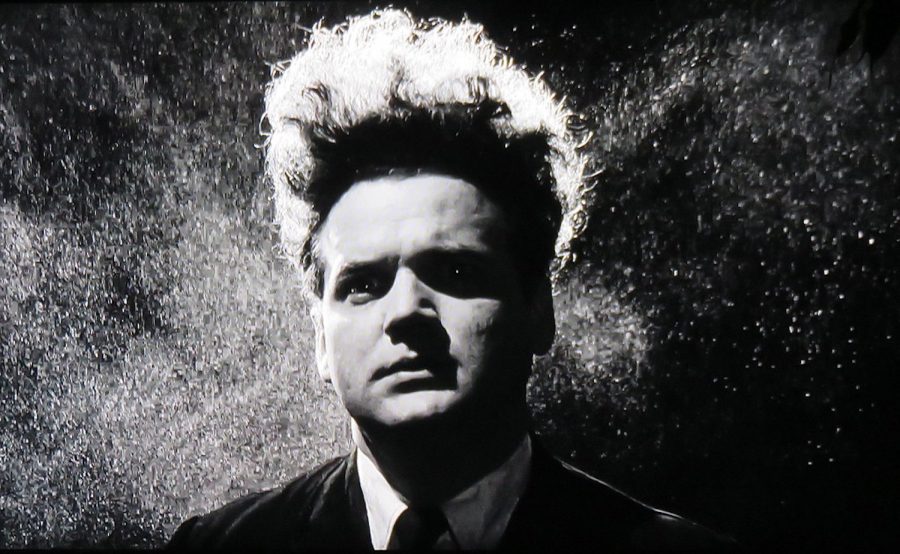My nights are mostly nonsense; I’m either actively awake or actively asleep. I don’t sleep easily; lie there, eyes-open, eyes-closed, awake for a long time for all my life for reasons no one has been able to figure out. But when at last I take the gift of sleep, I enter a most strange dimension. In my waking self, my spatial memory is non-existent. I get lost in Pankow. “Making L’s with my hands” does not help me figure out which way is left and which is right. What I can remember, however, every morning, is a dream. Not merely a memory of a memory hiding in the recess of a bad night’s sleep. I remember every detail. The color of the curtains in the room, the number of flowers in the vase, the dialogue, what I’m wearing, who I am. I can recall a maximum of three dreams from the previous night, but I average around two. But just like you probably have no idea what you ate for dinner a week ago, eventually the dream falls away. I make a point of remembering the ones I want to remember and I let the rest go. People always tell me to write them down. I’ve protested this practice. A dream is ineffable, not simply language, it isn’t just a story… But for the month of November I gave it a go. I recorded every dream, and they were fairly routine.
On Likenesses



On Waves, the Body, and the Soul
I’m skeptical about dreams as “messages.” I subscribe to the theory of dreams as sorting through the flotsam and jetsam of the day (Information-Processing Theory), as well as interpretation of the brain’s heightened neural activity (Activation-Synthesis Theory). Throughout deep sleep, the brain is dominated by the slow Delta waves. REM sleep, however, where we experience the majority of dreams, is marked by Alpha waves, the same waves active in our waking mind. The more Delta wave sleep one gets, the more rested one feels. However, if an individual does not get enough sleep in general, then there is a kind of “REM pile up” effect; the next nights will likely be more REM sleep heavy. Therefore, those with sleep troubles are more likely to experience vivid dreams because there is more REM sleep to catch up on. With more REM sleep, there is less time for Delta waves. It’s a Sisyphean struggle for the non-sleepers.
Surely some dreams (like some waking thoughts) are significant. Freud said it himself, “sometimes a cigar is just a cigar.” Sometimes a blue-haired man installing red velvet curtains in my dorm room is just that and nothing more. Prophetic is a word that came up consistently in my interviews with Vala Dream Experts (the name Vala means “prophet”…). Perhaps the dreams are something Dionysian, an explosive exploration of the self, free from the solidity of the real, or rather what is deemed to be the real. A dream’s resistance to being remembered supports this, its unwillingness to be brought into the conscious realm (although, of course, I tend to remember my dreams). I’m not sure the dreams point to anything truer than what is found in the waking world, some more essential essence. Maybe it reveals something equally true, some fundamental yet untouchable concept that, while present in the waking world, is more easily digested in the absurdities of sleep. The idea cannot be handled in the analyzing waking mind but can live in a place where we don’t question its strangeness.
For Nietzsche, dreams are a link to something more primitive, a more original self or existence that is vulnerable to deception (which might explain why this month I was married twice and thrice divorced). According to Nietzsche, it is because of dreams that a differentiation was made between soul and body. Perhaps the dream relinquishes the limitlessness of the idea from the cage of its form. Sometimes it’s nice to think about a kind of “deconsolidation” of soul and body in the moments before sleep, a breaking apart of the corporeal and the spiritual, preparing to leave the physical and enter the beyond.
But mostly, I’d really like to just mindlessly fall asleep.
On Vala’s Dreamworld and the Gruesome
“It’s like a set scene where the set is very put together but the things that happen on that set are unpredictable.”- Lóa (my 15-year-old sister).
…
“When the mind understands, it somehow turns in on itself and inspects one of its own ideas; but when it imagines, it turns away from itself and looks at something in the body that conforms to an idea—either one understood by the mind or one perceived by the senses.” – Descartes, “Sixth Meditation: The existence of material things, and the real distinction between mind and body,” Meditations.
…
A Vala Dream is not a place most people would choose to be. Asking people familiar with my dreams to describe them, fear (frightening, scary etc.) was in the top five of every list.
I called my fifteen-year-old sister Lóa to ask about my dreams. She’s a key witness, someone who has grown up learning my dream self as wholly as my waking self. Some time in the interview she tells me that the word “dream” in the opening seconds of the call triggered a specific image. She remembered more details of the dream than I did.
“That dream you had where Brian was burying all his children he had murdered in the backyard and planting bushes over them… and there were thousands of bushes. I felt actual fear,” she pauses, “even though it was out of your imagination, I thought about and contemplated it. I had real stomach unease.” Brian is our father. Meanwhile I had had little reaction to this dream. “A really big forest and it’s a forest where bad things happen but also it doesn’t exist,” my friend Clay says, imagining my dreamworld. Of course, he had not heard the aforementioned murder-bush dream.
The majority of my dreams might be (and have been) described as “nightmarish,” “violent,” “gruesome.” There are certain dreams I know people cannot stomach (I shall omit these as a courtesy). But I’ve never had a nightmare in the sense I understand it; neither the dream self nor the person lying in bed is afraid.
On Plato
Clay: Maybe the dreams tell us things we are too low to understand.
Vala: So, dreams are a way to elevate us?
Clay: Or point out structures we are unable to see.
Vala: Like Socrates.
Clay: Yeah.
…
Vala: How would you describe my dreams?
Brian: Long.
…
ACT I
I’m wearing a black cashmere sweater and nervously pacing in a room of a basement. I am waiting for someone. A grey light enters faintly from square windows along the top edge of the wall. They reveal the grimy sidewalk of The City. There is a purposeless wall jutting into the room two-thirds lengthwise, two-thirds widthwise. I stand in the larger part of the room where there is a long oak table with two benches on either side. In the corner of the room is a porcelain sink with a mirror above it.
Then, she walks in. She has blond hair, green eyes, about my age. She holds a basket with a grey blanket in it that trails on the ground. I scoop it up and put it in the basket but like something torturously Greek, it falls out again. I put it in the basket. Falls again. She sits down at the table, facing the wall and I rush to sit across from her. I’m sitting up straight, I want to make a good impression. But she is slouching, laying her head on the table and rolling it from side to side. She moves her left hand in a circular motion, pointing out some distinct cycle, some important roundness I should recognize. Then she speaks, aggressively. She’s not fooled by the theater of American politeness. The words she says are deliberate, pointed, in English, but I understand none of it. I do, however, know that whatever she is saying is true. And I do not like what I am hearing. So naturally, I get up and leave. Not, of course, before checking my reflection in the mirror.
There is a white dot on my black sweater and I try to rub it out. In the mirror I see it grow…dime-sized, baseball-sized, apple-pie-sized… until the entire sweater, once black, is now white. I leave the room.
ACT II
Outside is a hallway where my longtime friend Ellie sits on a dark green couch. I put my head in her lap and cry. I can’t see anything, my eyes are closed, only watery impressions, light through tears.
Oh! I am late for an art history class in The City! I get up abruptly and suddenly I’m in The City. No stairs. No ascension.
ACT III
The City is a little bit of every city I know: Cleveland, New York, Reykjavík, Berlin. It’s dirty, quiet and dystopian but not uncomfortable. It’s a city of familiar smog. The traffic, I notice, is being weird (the house-sized taxis are moving very slowly today!).
As I’m rounding a corner onto a large street I notice something strange in front of the Parthenon, which is in its usual place, tucked between a brick apartment building and a shabby laundromat. There are people gathered around a mysterious triangle in front of the Parthenon. The triangle (7-5-3-1) is made up of stacks of massive white horse corpses and covered in a semi-translucent “film.” In front of the horses are four stone statues of identical veiled and robed “guardians.” People are beginning to wrap their arms and heads in the film that covers the horse-corpse structure. Once fully facing this wide street, I see that there is a white triangle like this on every block.
On Destinations
“At that command
the dream went winging off, and passing quickly
along the fast trim ships, made for the king
and found him soon, sound asleep in his tent
with refreshing godsent slumber drifted around him.”
– The Iliad of Homer, (2.17-21).
…
Except for the fact that it’s in black and white, David Lynch’s film Eraserhead is the closest representation I’ve seen to my nighttime stage. I try not to overinterpret the importance of specific locations. I’ve read that many dreams have a tunnel vision effect, where the background becomes secondary to the dreamer’s focus on specific objects. The dream settings I experience tend to be densely curated. However, I find perspectives, angles, depths, and distances more interesting, which of course are affected by the dream’s specific landscape and architecture. Here are some of the places I visited this month.
Castle in Medieval Russia
Parking Garage
Dock by a Volcano
Invisible Parisian House
Security Camera Footage
A Mountain of Flowers
I ascended and descended (changing planes, sometimes walking, sometimes levitating), put my head on flat, horizontal surfaces (tables, the ground etc), and found myself between things (talking people, walls, trees, curtains). The abstract states, transitions and in-betweenness, are what I feel more than the actual sensory experience they inhabit.
On Being Someone Else
“And now, the generalissimo will use these tortellini to turn you into a horse.” – Dream-Vala
…
“It’s you but you’re still a shadow to that person.” – Lóa
…
In 60% of the dreams this month I was “Vala.” Other times I was a soldier, a tiny old woman, my brother, a man working in a Späti. I interpret this as a way of evading concrete representation. Perhaps I am exploring possibilities.
Once I was a carpenter, a man in his 40’s with a nameless wife and two nameless daughters, five and twelve years old. One day I went blind and the rest of the dream was in darkness; only sound, smell, and touch remained. My twelve year old was going through “that phase,” where dad is a constant embarrassment, especially now that he’s gone blind. “This is the most interesting thing that has ever happened to you, Dad.” I chuckle. It’s a good, hearty chuckle. I decide to hike Ésja, a mountain near Reykjavík which Waking Vala has walked many times. I can feel the grass brushing against my ankles as I ascend, can smell the Lupine, and hear the rocks shift under my feet. I wonder what my dreams will be like now that I’m blind. I face the horizon and the blackness breaks for a moment, a faint white line cutting across it.
“What do you think?” I ask Lóa, “do I want to be a middle-aged man?” The Freudian response: penis envy. Carl Jung would explain that this is a critical aspect of my character that, due to its underrepresentation in my waking life, is forced to emerge in my dreams. Lóa references another master of the dream-realm: David Lynch. “I’m thinking about Bob from Twin Peaks,” she responds, “and how Bob can inhabit a new person.” This is not the first time Lóa has compared me to Bob, but here I get what she means. The difference, however, is that I am that person.
I ask Clay, “If you met my dream self, what would they be like?”
“Meeting your dream self would be like meeting someone who has experienced all things and all times and is just, like, willingly participating in society out of pure choice because they could very easily ascend to a higher realm of being.”
I tell Lóa another dream and she begins responding…
“So when he locks himself in the porta-potty and he’s writing about the woman who eats her husband and he finds a lion cub in the closet– ”
“Woah, woah, woah, who’s this he?”
“You.”
“I never said I was a man – wait, tell me exactly what you’re picturing.”
With not a millisecond of hesitation, “slim, lanky, bald on the top, hair on the sides. You look… not empty… a little bit empty. Almost like you are so aware like… you are in a state where you feel like you see and feel things more deeply than everyone else and that makes you sad and makes you feel alone.”
“Geez, okay. Is that something egotistical? That my dream self would feel special that way?”
“No, not really. Because nobody knows.”
“The people in the dream don’t know?”
“Yeah.”
“Wait, don’t know what?”
“That you see the world differently.”
“How do I see the world differently?”
“Hmmm, I don’t know, I guess… well, a film would affect you more… you’d find beauty in things that people don’t necessarily find. You find an intense source of beauty.”
I’ve never wanted to be a slim, lanky, balding, empty guy more in my life. Jung may be onto something.
On Remembering
“But when I speak of ‘remembering’ a dream there is nothing outside of my account of the dream (provided that I understand the words that compose it) to determine that my account is right or wrong. … Since nothing counts as determining that my memory of my dream is right or wrong, what sense can the word ‘memory’ have here?” – Norman Malcolm, Dreaming.
…
I know that every time you recall a memory it changes. Dreams are especially vulnerable to this because they exist in our realm as only a memory. Even if they’re written down, they are being ripped into a dimension in which they don’t belong; they can’t exist. That said, I do enjoy reading back on the short synopses, like bizarre acts of an eternal play. Some of the dreams I can’t picture any more. I can imagine the imagined version of the scene, the images evoked by the words on the page- not the images themselves. It’s a distant memory filtered through too many layers of remembrance to be something I can claim to know or understand. They’re not made to be totally understood by the waking. I just have a book of someone’s stories now.

